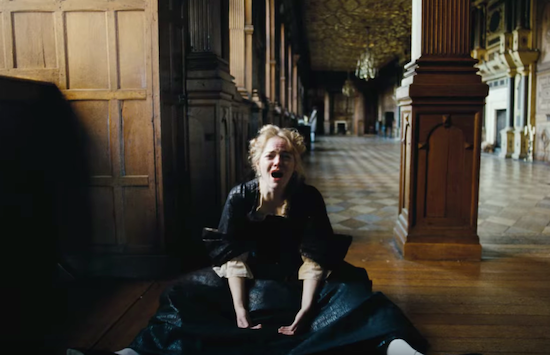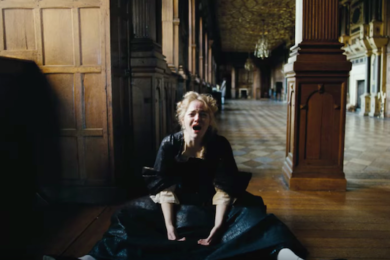Throughout history Queen Anne has often ended up being portrayed as the ultimate tragicomic English monarch. I remember children’s history books which sniggered at how she was so fat when she died that her coffin was almost entirely square, that she was nicknamed Brandy Nan for how much she would guzzle the stuff.
But this was also a woman who endured seventeen miscarriages, whose life was marred with chronic illness; a woman whose doctor wrote after she died, “I believe sleep was never more welcome to a weary traveller than death was to her.” A curious figure who has been viewed as concurrently clownish and melancholic could only have been played by Olivia Coleman, and it’s truly one of her best performances.
In The Favourite, Greek surrealist director’s Yorgos Lanthimos’ third English-language venture, Olivia Coleman characterises Queen Anne as a fractious child in a dying middle-aged woman’s body. She is wailing and impatient and can’t focus on important affairs of state for too long before demanding the comfort of her closest friend Sarah Churchill, Duchess Marlborough (played by Rachel Weisz) or food, or her seventeen surrogate ‘children’ – the collection of rabbits she keeps caged in her chambers.
And yet we also get a glimpse of that incredible human sadness that Coleman is so adept at bringing to even her most comedic characters, and we are reminded that this is a woman whose life had been marred by the kind of tragedy and loss that most people can only have dreadful nightmares about. It’s no wonder she retreats to inane activities like lobster racing and feasting on sickly sweet cake which she promptly vomits up before stoically finishing the slice.
Amongst the madness, in walks Abigail Hill, a young aristocrat who has fallen on hard times, sold by her father to “a balloon-shaped German man with a thin cock”. She starts the film being quite literally flung into the shit, only to rise steadily but surely through the quagmire of palace politics to perch coquettishly at Queen Anne’s side.
Abigail and Sarah Churchill were real-life cousins, and in the film the two women dally about each other with barely-concealed venom as each vies for the monarch’s affection. Both women have entirely different motivations – Sarah is characterised as a political schemer who hungers for power while also genuinely caring for her Queen. Abigail is an individualistic anarchist, her every action carried out with the aim of satisfying her own whims and goals, all while hidden behind the freckled charm of an outwardly sweet and charitable demeanour.
The absurdity of the sabotage amongst these courtiers and politicians is amplified by the physical comedy: books are flung, conversations cut short by the simple but effective method of pushing people over. It’s as though the slapstick is a fictional extension of the power struggle, breaking through the pleasantries of court in a surreal context so the characters can more succinctly convey their frustration or ulterior motives.
So much of this film, for me, brilliantly highlighted elements of what I see as both monarchy and aristocracy in a state of decay: one of the first scenes in this film is a triumphant duck race through Kensington Palace, and later there’s a scene where a large naked man is raucously pelted with fruit. Both tableaux are operatic in their slow-motion frenzy and speak to me of a strange and decadent era, the origins of which lie in the reign of Charles II – a time where aristocrats descended into childish ennui and hysterical games in the face of the rising powers of Parliament.
Even the sickly, mustardy colour of candlelight in the darkness conjures up an atmosphere of disease and decay. The film is as riotous and rude as any Restoration Comedy of the time (even the film’s name is reminiscent of a 17th century play), but there are also surreal and anachronistic moments which I loved, like a dance scene in the first half hour which could have been lifted directly out of a Naked Gun film.
The camerawork is truly something to behold, and cinematographer Robbie Ryan proves that he is one of the most intriguing and innovative DPs working in cinema right now. His involvement in the film marks a departure for Lanthimos from working with Thimios Bakatakis, and for the most part this new partnership works well. Ryan’s roving camera pans flow like liquid, pulling the story along with it even more than a Wes Anderson fixed-dolly pan. I do, however, take issue with the fish-eye lens which, whenever used, jolted me out of the story. It’s a very modern cinematic technique that feels too at odds with the period setting. Call me old-fashioned, but fish-eye lenses are better for filming skateboarding than feature-length fiction.
The film also seems to lose its way as it draws to a close, which corresponds with a withdrawal from historical fact. The entire film is, of course, a very loose adaptation of real events, but after the storyline diverts into completely made-up milestones in the characters’ stories (which are nonetheless entertaining), the wind seems to go out of the sails somewhat and the film loses its lustre.
The final scene, the lasting image of the film, is an overlay of three different images, which is visually stunning and intriguing, but feels a bit too ponderous and isn’t the full stop on the closing sentence of the story that I’d hoped for or envisioned. It seems a shame for such a sharp film to end on a note that is so open to interpretation.
Overall though, this is a marvellous outing by Lanthimos, and will no doubt become a serious contender when awards season gets into full swing.
The Favourite, by Yorgos Lanthimos, is in UK cinemas from 1 January 2019



